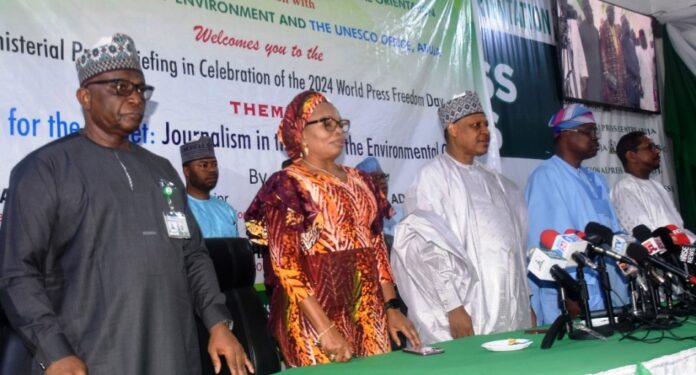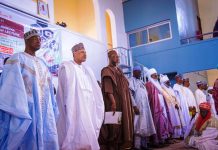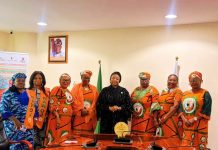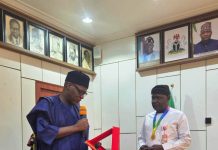Minister of State for Environment, Iziaq Adekunle Salako has called for effective reportage Environmental issues in the country’s drive for environmental advocacy and citizenship, emphasing that ignorance, lack of awareness and appropriate knowledge about the climate crisis is still rampant in our society.
Salako disclosed this at the occasion of the joint press conference in commemorations of the 2024 world press freedom day with a theme: “a press for the planet: Journalism in the face of the environmental crisis,” in Abuja.
“As we gather here today to commemorate the World Press Freedom Day in our country, I am deeply honoured to address you all, not just as the Minister of State for Environment, but as a passionate advocate for the healthy preservation of our planet and a worker in the stewardship of the earth,” he said.
He commended the organisers for putting the event together and for also inviting the Federal Ministry of Environment as a partner, adding that the press and journalists constitutes the framework for informing, educating, stimulating discussion, mobilizing and setting agenda for the general public.
“Press for the planet at this point in time is therefore most needed if we are to get the public behind global and national agenda like net zero, energy transition, biodiversity beyond national jurisdiction, 30 by 30, ending plastic pollution and such other pathways set forth to address the environmental crisis.
“Federal Ministry of Environment is promoting nature based solutions through tree planting, mangroove restoration, urban greening and restoring wetlands, and also working hard to end gas-flaring and plastic pollution, remediating oil polluted communities, expanding our protected areas, addressing desertification, drought, flooding and erosion,” Minister said.
He stressed that in doing this, the ministry is fully in tune with the inclusivity agenda of President Bola Ahmed Tinubu which is a key pillar in the eight-point presidential priority.
“As we commemorate World Press Freedom Day, I call on us to reaffirm our commitment to the principles of a free and independent press, a sine qua non for effective climate journalism.
“Press freedom is indispensable to promote transparency, accountability and social justice, critical to communicating the threat posed by climate crisis and making informed decisions to be more environmentally responsible.
“You as journalists have a critical role to play in driving environmental policy formulation and implementation and also in shaping public perception about the crisis.
“Let us therefore work together, across sectors and borders, to harness the power of the media in addressing the environmental crisis and advancing sustainable development,” he said.
In his address, the Minister of Information and National Orientation, Mohammed Idris reaffirmed that the WPFD theme underscores the urgent need to address the environmental crisis and advance sustainable development, including climate change, biodiversity loss, pollution and resource depletion, which pose severe threats to humanity and the planet, demanding immediate and decisive action.
“In the face of this crisis, journalists emerge as truth guardians and accountability champions. They expose environmental injustices, unveil wrongdoing and amplify the voices of those most affected by environmental degradation. Through investigative reporting, they hold governments and corporations accountable for their actions and advocate for policies that promote sustainability and protect the planet,” he added.
The Minister acknowledged the importance of responsible media coverage in enlightening, informing and educating Nigerians and the world. He emphasised that through credible and timely information, everyone can be well-informed, and the media can serve as a valuable tool for promoting transparency and accountability.
He pledged that the ministry and government will ensure the safety and provide an enabling environment for journalists to carry out their assignments.
“As we celebrate World Press Freedom Day, it is crucial to reaffirm our unwavering commitment to protecting the rights of journalists, ensuring their safety and security and building a future where journalism thrives, press freedom is upheld and our planet is safeguarded.”
While speaking the Director-General of UNESCO, Ms. Audrey Azoulay highlighted that WPFD is a call to action to protect journalism and ensure free, pluralistic information.
The DG enjoined participants to recognise that the climate challenge is also journalistic and informational, highlighting that effective climate action requires access to free and reliable scientific information.
According to Asoulay, this year’s WPFD encourages governments to engage with the media to address climate change issues that contribute to insecurity in Nigeria.
It calls for major social networks to enhance their moderation and regulation measures to combat misinformation and conspiracy theories related to climate change, aligning with the guidelines for the governance of digital platforms published by UNESCO. It also urges equipping citizens with critical thinking skills to confront misinformation.
Azoulay called for protection of journalists, media professionals, artists and scientists who often face threats, harassment, violence and censorship for their work. She cited a UNESCO study showing that environmental reporters have faced attacks, threats, or pressure, with 44 environmental journalists killed in the last 15 years.
Ibrahim Haruna
Head, Press and Public Relations Unit






